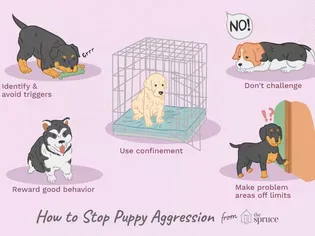Conflict Aggression in Puppies
Updated on 04/26/24

Unleashing Harmony: A Guide to Understanding and Managing Conflict Aggression in Puppies
Puppies, those adorable bundles of fur, can bring immense joy into our lives. However, as they navigate the complexities of social interactions, they may sometimes exhibit conflict aggression. Understanding the root causes and employing effective management strategies can help ensure that these furry companions thrive and maintain healthy relationships with their canine counterparts.
Decoding Conflict Aggression in Puppies
Conflict aggression, as opposed to defensive aggression, is a type of aggression that arises from social interactions and resource competition. Puppies may display this behavior when they perceive a threat to their status, possessions, or territory.
Symptoms of Conflict Aggression:
* Growling
* Barking
* Lunging
* Snapping or biting
* Staring
* Stiff body posture
* Raised hackles
Causes of Conflict Aggression:
* Resource guarding: Puppies may aggressively defend food, toys, or sleeping areas.
* Social hierarchy: Puppies may compete for dominance within a litter or group.
* Fear or anxiety: Puppies experiencing fear or insecurity may resort to aggression as a coping mechanism.
* Lack of socialization: Puppies not properly exposed to other dogs may develop social deficits, leading to conflict aggression.
* Genetic predisposition: Certain breeds may be more prone to exhibiting conflict aggression.
Examples:
* Resource guarding: A puppy growls and snaps at another puppy who approaches its food bowl.
* Social hierarchy: Two puppies engage in a play fight that escalates into a conflict aggression incident where one puppy attempts to dominate the other.
* Fear: A puppy lunges at an unfamiliar dog, perceiving it as a threat.
Management Strategies for Conflict Aggression:
* Socialization: Engage your puppy in supervised interactions with other dogs of various ages and temperaments to promote social harmony.
* Resource management: Separate feeding and sleeping areas to minimize competition. Provide multiple resources to reduce the perception of scarcity.
* Training: Teach your puppy basic obedience commands such as "sit," "stay," and "leave it."
* Positive reinforcement: Reward your puppy for calm and appropriate behavior in social situations.
* Desensitization and Counter-Conditioning: Gradually expose your puppy to potential triggers while pairing those triggers with positive experiences. For example, tossing treats during supervised interactions with other dogs.
* Professional help: If your puppy's conflict aggression persists despite your efforts, seek guidance from a qualified veterinarian or animal behaviorist.
Conclusion:
Conflict aggression in puppies can be a manageable issue with the right approach. By understanding the causes, implementing effective management strategies, and seeking professional help when necessary, you can help your furry friend develop into a well-adjusted canine citizen, ready to navigate social interactions with confidence and harmony.
Explore More Pets

Basic Training
Puppy and Baby Introductions

Working Dog Breeds
All About Search and Rescue Dogs

Dog Treatments
Puppy Vaginitis: Signs, Causes and Treatment

Dog Adoption
After More Than 1,200 Days in the Shelter, Coco Goes Home

Basic Training
How to Train Your Puppy to Go on Potty Pads

Hybrid Dog Breeds
The Difference Between a Mutt, Mixed Breed, or Designer Dog?

Dog Treatments
Nail Problems in Dogs

Puppies
7 Reasons Why Two Dogs Are Better Than One